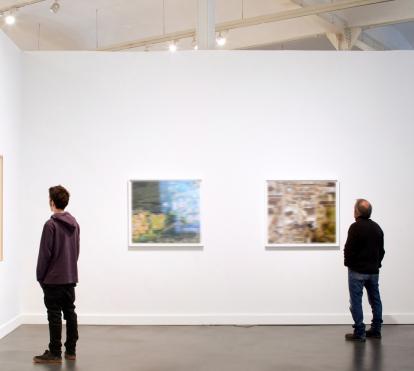
Transnational areas are oversexed territories where the expansion of prostitution and female slavery plus the feminisation of the job market are the ingredients of daily life. The situation along the Mexico-US border confirms this stark reality: the maquiladora assembly plants only hire female labourers who live in makeshift barracks built in the desert, prostituting themselves weekends to make ends meet. Entitled TOTAL WORK, curator Montse Romaní (Lloret de Mar, 1968) has designed in the Sala Montcada an exhibit with insights into occupational destabilisation and the feminisation of poverty in modern societies. Romaní maps out a counter-geography of occupational instability, establishing a dialogue between the work of two artists: Ursula Biemann (Zurich, 1955) and María Ruido (Ourense, 1967). While Biemann exhibits part of her World Sex Work Archive, featuring videotaped interviews conducted in transnational settings (the Mexico-US border, the Mekong region, the former US Marine base in the Philippines, etc.), Ruido, working within a more local context, outlines other routes of instability and its manifestations using audiovisual presentation and analysis of feminist discourse. The showing is rounded out with a number of discussions at the Sala Montcada featuring the participation of the "Precarias a la Deriva" Group, Marion von Osten and Virgínia Villaplana. The TOTAL WORK exhibition, curated by Montse Romaní, can be visited at ”la Caixa” Foundation's Sala Montcada (Montcada, 14), from 15 October to 7 December, 2003.In recent years, the concept of work has undergone a number of transformations which, paradoxically, have fuelled the process of occupational destabilisation, widening social and economic gaps. The former "Fordesque" model, based on tangible work (manufacturing structure, assembly-line production, fixed units of time and space, etc.) has given way to a new production model: the so-called "intangible work" (temporary contracts, prolonged shifts, unpaid holidays, working from home, etc.). Women are among the groups most vulnerable to these incipient changes. TOTAL WORK invites visitors to reflect on the transition from tangible to intangible work in the global economy through the analysis of two processes: the feminisation of the workforce and the feminisation of poverty. To achieve this, the exhibit is based on a dialogue between the work of Ursula Biemann and María Ruido to portray (using pictures, written words and sound) a counter-geography of instability, or a narration of subjective, personal experience. Biemann presents sequences taken from interviews of Juana Azúa (Mexico City, July, 1998), Siriporn Skrobanek (Bangkok, January, 2000) and Iveta Bartunková (Prague, January, 2001). These videotaped interviews make up part of the World Sex Work Archive (WSWA) compiled by Biemann between 1998 and 2003 from the statements of numerous women living and working in transnational locations (border areas, free trade zones, ghettos of dispossessed workers, tourism centres and leisure areas for military personnel stationed overseas), combined with photographs of these areas. But the WSWA is not focused merely on the world's new gender geographies, but also the creation of numerous counter-geographies. Thus, it includes interviews with female activists and critics who struggle to change this harsh reality. With her background as an intangible worker in the cultural field, María Ruido now presents her Real Time project, which offers a parallel interpretation of certain feminist discourses through film, texts and interviews. Real Time starts with a number of audio-visual testimonials based on the dialectics of negativity which make up strategies of sabotage (using off-field techniques, reframing, coincidence between real-time of the shot-sequence and diegetic time, etc.) to serve as a means of escape and outlining a possible theory of representation. This exhibition uses the archive as a method to order and organise knowledge and reality, politically restructuring certain registers as well as visual and conceptual patterns. This could be understood as a counter-archive; an open, detachable, subjective and partial device designed to revise the role of cultural producers in the late-capitalist system. Therefore, this exhibition is not meant as a portrayal of finished works, but rather as a proposed discourse built upon a dynamic three-way relationship between the artists, curator and visiting public. With TOTAL WORK ”la Caixa” Foundation's Sala Montcada is embarking upon a new, more open and dynamic era. With a view to promote the exchange of ideas between the curator, artists and the public, the exhibition is rounded out with three discussions to be held at the Sala Montcada facility itself. The "Precarias a la Deriva" Group, associated with the women's okupa (squatter movement) La Eskalera Karakola house in Madrid, will present the publication and audiovisual material which it has recently published on the destabilisation of women's job market (4 December, 7:30 pm). Artist and curator Marion von Osten will initiate a discussion based on the question, "What can we learn about the current model of intangible production from feminism?" (15 October, 7:30 pm), while the visual artist, researcher and curator Virgínia Villaplana will analyse gender-based production in visual culture (6 November, 7:30 pm). Total WorkFrom 15 October to 7 December, 2003”la Caixa” Foundation's Sala MontcadaMontcada, 1408003 BarcelonaInformationwww.fundacio.lacaixa.es/salamontcadaTel.: 902 22 30 40Hours:Tuesday to Saturday, 11 am to 3 pm and 4 to 8 pm Sundays and holidays, 11 am to 3 pmFree admissionwww.fundacio.lacaixa.es